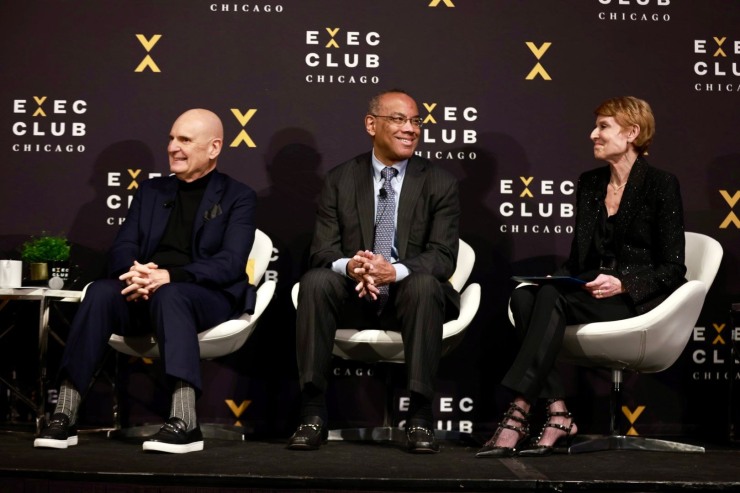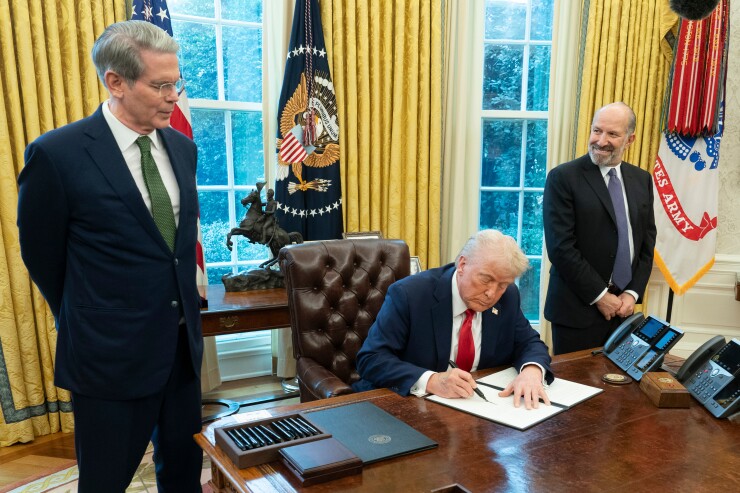With President Donald Trump's short-lived federal funding freeze and the potential end of the tax-exempt status on the horizon, the public finance arena is off to a rough start in 2025.
Late in the evening on Jan. 27, the White House
Impacted areas included "financial assistance for foreign aid, nongovernmental organizations, DEI" and more, but the freeze does not apply to programs that provide aid directly to individuals, according to the memo.
"It means no more funding for illegal DEI programs [and] it means no more funding for the Green New Scam that has cost American taxpayers tens of billions of dollars," Karoline Leavitt, White House press secretary, said during a press conference following the debut of the order.
Despite only lasting for two days before being formally rescinded on Jan. 30, the order generated a significant amount of fervor from local government leaders and public finance experts alike, who worried that the cuts would impact state-necessary funding.
This drive has pushed roughly 22 Democrat-led states to
The important thing for public finance experts to know is that while the memo fell short, the campaign to curtail what it deems as unnecessary government funding will continue.
Read more:
Equally important for the municipal market is the potential death of the tax-exempt status for bonds.
In speaking with The Bond Buyer's
"We talk about tangible things in their district that they understand will be impacted if the tax exemption goes away," Brock said. "Then it's up to the investor community to tell the story about if you rip away the exemption from grandmas and grandpas, then you've got political suicide."
As Republican changemakers determine what the cost of extending the soon-to-expire provisions of Trump's Tax Cuts and Jobs Act could look like, muni experts say that using models like dynamic scoring or a "current policy" baseline could play into what the final price tag looks like.
Read more:
Dive into expert predictions for what the public finance market could look like in 2025, and what leaders need to be wary of.

Finance experts weigh in on uncertain bond market future for 2025
The prospect of fewer rate cuts from the Federal Reserve, political policy questions and an ongoing host of fires in Los Angeles have created a fair amount of uncertainty in the markets — leaving many finance experts less than confident for 2025.
In a discussion at the Executives' Club of Chicago's Annual Economic Outlook panel earlier in January, KPMG Chief Economist Diane Swonk, Ariel Investments Chairman and Co-CEO John Rogers, Jr., and former Deutsche Asset Management Vice Chairman Dr. Bob Froehlich offered differing views of the year ahead.
"Now we've got a lot of policy changes coming, the level of inflation is still high and the Fed's battle against inflation is not yet over," Swonk said. "Policy is still technically in restrictive territory, and whatever the Fed doesn't do, the bond market will clearly do for it."
Read more:

"It's going to be a tough balancing act": Forecasting the FOMC in 2025
Members of the Federal Reserve's Open Market Committee have a lot to juggle in 2025, as numerous policy proposals from President Donald Trump and inflationary woes muddy the legislative waters for the year.
Steve Skancke, chief economic advisor at Keel Point, said in an interview with The Bond Buyer's
"They want to have full employment, they want to contain inflation, and certainly, certainly, the imposition of tariffs will contribute to inflation, both with the immediate price increase and with the disruption of supply chains," Skancke said.
Read more:

MSRB leaders see active regulatory year ahead
As top officials with the
"Trying to provide an outlook for 2025 I think there's only one word that anyone can use, and that's uncertainty," Mark Kim, CEO of the MSRB, told The Bond Buyer's
Other noteworthy efforts include eying how live quotes and bid-wanted requests are distributed and understood throughout the marketplace, as well as further regulatory easing on broker-dealer firms.
Read more:

Promised tariffs, immigration changes skew 2025 economic forecasts
Wealth management experts are predicting strong economic performance in 2025. But ongoing promises for tariff and immigration reforms out of the Trump administration could signal clouds on the horizon.
In speaking with The Bond Buyer, James Ragan, director of wealth management research for D.A. Davidson, said
"[If] we get a lot of deportations, we start to limit labor supply that could pressure wages, which might be good for consumer spending over time, but would probably lead to a higher inflation than expected," Ragan said.
But the 10-year yield and the curve's positive slope are fueling views that the bond market will remain strong through this year.
Read more:

Tax policy uncertainties give muni market experts pause
Tom Kozlik, managing director and head of public policy & municipal strategy for HilltopSecurities, worries 2025 could spell the end of the municipal bond tax exemption.
"Lawmakers will need enhanced pay-fors, putting a substantial target on the municipal bond tax exemption," Kozlik said. "I think there is a 50% or greater chance the municipal bond tax exemption will be significantly curtailed or even completely eliminated in 2025."
The fear comes from President Donald Trump's landmark Tax Cuts and Jobs Act of 2017, which capped the state and local tax deduction and also did away with advance refundings of tax-exempt bonds. Deductions are limited to $10,000, but there have been state-issued workarounds used by business owners.
Read more:





